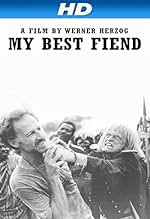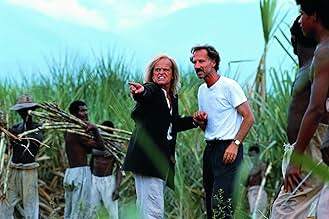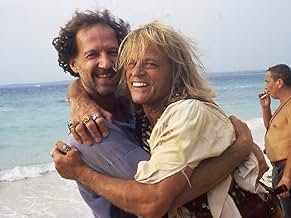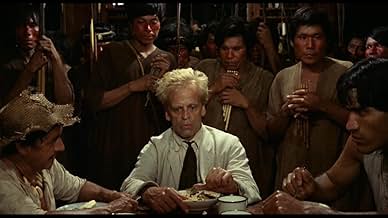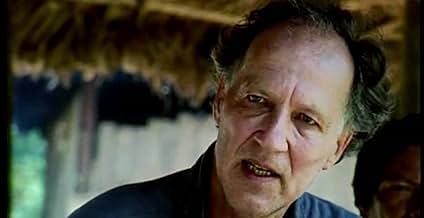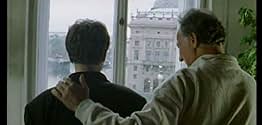Kinski, il mio nemico più caro
Titolo originale: Mein liebster Feind - Klaus Kinski
VALUTAZIONE IMDb
7,8/10
12.758
LA TUA VALUTAZIONE
Anni dopo, avrebbero condiviso un appartamento dove, in un impeto di rabbia di quarantotto ore, lui distrusse completamente il bagno. Da questo caos è nata una partnership violenta, amore-od... Leggi tuttoAnni dopo, avrebbero condiviso un appartamento dove, in un impeto di rabbia di quarantotto ore, lui distrusse completamente il bagno. Da questo caos è nata una partnership violenta, amore-odio, profondamente creativa.Anni dopo, avrebbero condiviso un appartamento dove, in un impeto di rabbia di quarantotto ore, lui distrusse completamente il bagno. Da questo caos è nata una partnership violenta, amore-odio, profondamente creativa.
- Regia
- Sceneggiatura
- Star
- Premi
- 1 vittoria e 2 candidature totali
Klaus Kinski
- Self
- (filmato d'archivio)
Guillermo Ríos
- Self
- (filmato d'archivio)
Andrés Vicente
- Self
- (filmato d'archivio)
Paul Hittscher
- Self
- (filmato d'archivio)
Mick Jagger
- Self - Wilbur
- (filmato d'archivio)
Thomas Mauch
- Self
- (filmato d'archivio)
Jason Robards
- Fitzcarraldo
- (filmato d'archivio)
Walter Saxer
- Self
- (filmato d'archivio)
Recensioni in evidenza
10sound-4
I first caught this film midway through, when it was on IFC. Not only did it stop me in my tracks, but I looked up to see when it would next be on so I could set the VCR. Though Herzog attempts to portray himself as the cool and reasonable half of this dastardly duo, his own megalomania and ego shine through. This documentary catches on film the fine edge between brilliance and insanity, and the result is simply stunning. This is not a biography of Kinski but rather a kind of valentine to him that celebrates his (and Herzog's) mad genius.
As a kid I saw "Aguirre La Colere de Dieu" on TV and was terrified by Kinski. But after all, what counts is only the film, and on movies you never see the director. Now if you watch "Mein liebster Feind - Klaus Kinski" at last you can see the other side - Werner Herzog. Or have glimpse of it.
Because of course, everything is from Herzog's point of view, so in a way this documentary does not differ from the real movies themselves : you see Kinski acting like a madman in front of the camera or not. Shouting at people. One terrifying scene is an excerpt from Fitzcaraldo where Indians seem to complain about the character played by Kinski, while Herzog is commenting that those very Indians had offered to kill the actor...
Then you've got comments by other people, particularily actresses who witness about Kinski's other side, shy, caring. And the final scene with the butterfly - something Kinski the actor could do, but Aguirre could not. It seems as if Herzog, having showed only one side of Kinski all these years, tries to explain it was all for the movies. Even if he still portrays him as a mad genius (and coward at that), his selective memory tries only to remember the good times, a few rare footage of Kinski and himself having a good laugh.
What the documentary also stresses out is that the director and the actor could have been switched during the filming of Fitzcaraldo : Herzog explains how he was alone against everybody, believing the impossible, like the character in the movie. At this point only, Herzog seems to aknowledge the fact that he also was completely mad.
I recommend watching the documentary, and then watching Cobra Verde, Fitzcaraldo and Aguirre again.
Because of course, everything is from Herzog's point of view, so in a way this documentary does not differ from the real movies themselves : you see Kinski acting like a madman in front of the camera or not. Shouting at people. One terrifying scene is an excerpt from Fitzcaraldo where Indians seem to complain about the character played by Kinski, while Herzog is commenting that those very Indians had offered to kill the actor...
Then you've got comments by other people, particularily actresses who witness about Kinski's other side, shy, caring. And the final scene with the butterfly - something Kinski the actor could do, but Aguirre could not. It seems as if Herzog, having showed only one side of Kinski all these years, tries to explain it was all for the movies. Even if he still portrays him as a mad genius (and coward at that), his selective memory tries only to remember the good times, a few rare footage of Kinski and himself having a good laugh.
What the documentary also stresses out is that the director and the actor could have been switched during the filming of Fitzcaraldo : Herzog explains how he was alone against everybody, believing the impossible, like the character in the movie. At this point only, Herzog seems to aknowledge the fact that he also was completely mad.
I recommend watching the documentary, and then watching Cobra Verde, Fitzcaraldo and Aguirre again.
'My Best Friend' is one of the most fascinating documentaries I've ever seen about movies and acting. Werner Herzog and Klaus Kinski only made five movies together, but what extraordinary movies they are! Kinski made many, many movies, many of them absolutely awful (though all worth watching even if only for him). In fact it's difficult to think of any other actor of his undoubted talent who slummed it quite as much as he did. Herzog is regarded as one of Germany's greatest ever directors and made many fine movies without Kinski, but the two together were really something special. Just watch the astonishing 'Aguirre: The Wrath Of God' if you want to be floored by total genius! Much of this documentary deals with the trials and tribulations of that movie's troubled shoot, but their other four collaborations are also discussed. Their relationship was a complex one and really hard to get your head around. At times they literally tried to kill each other, but then there's footage included that shows their obvious warmth and affection for each other. You could say that this documentary provokes more questions than answers, and if you are looking for a straightforward explanation of Kinski's behaviour and what Herzog REALLY thought about him then maybe you could regard this as a failure. Anyway, I was enthralled and I think any fan of Kinski must regard this as essential viewing. From the opening footage of a raving Kinski on stage proclaiming he was Christ to the final moments of a butterfly flitting around his face this is mesmerizing stuff, and not to be missed by anyone with every a remote interest in this unique actor. Highly recommended!
I like this documentary and recommend owning it. There are so many scenes that one can jump to to find Kinski's leering face and saying something fantastic. I believe that he somehow opened up his third eye and could no longer see most of the world that we live in. ----Or am I being fooled--- either way, Kinski has left his mark or should I say scar across the face of theatre and film. My only wish is that someone somewhere compiles a volume set of his greatest scenes ranging from a star performance in a well considered artful Herzog film to all of his 'B' movie bombs.
I still enjoy hearing Herzog imitating Kinski and saying, "I was Monumental I was Epical!!!!" ---and his description in the beginning of the doc. when he throws a tantrum that lasts for several days, destroying everything in the bathroom to the point where you could pass every bit through a tennis racket.
That is power. Watch it and believe.
I still enjoy hearing Herzog imitating Kinski and saying, "I was Monumental I was Epical!!!!" ---and his description in the beginning of the doc. when he throws a tantrum that lasts for several days, destroying everything in the bathroom to the point where you could pass every bit through a tennis racket.
That is power. Watch it and believe.
Werner Herzog: Every grey hair on my head, I call Kinski.
The documentary made by Werner Herzog tells about the legendary love-hate relationship between the director who was ready to climb to Hell for his every movie and border-line insane genius actor Klaus Kinski who might have been one of the creatures from Hell that Herzog had to face. It is hard to imagine two people more different than Herzog and Kinski: "...stone and waves, the coldest ice and hottest flames have more in common, differ less" but they both were driven and obsessed artists. Famous for his wild and ferocious talent and temperament to match, Kinski was incredibly difficult to work with. He wrote about himself, "I am a wild animal born in captivity, in a zoo but where beast would have claws, I have talent".
Kinski's talent was fully realized in five films that he made with Werner Herzog over a fifteen-year working period, starting with astounding "Aguirre, the Wrath of God" (1973), and then following with "Fitzcarraldo," "Nosferatu" (1979), inspired by Murnau's silent vampire classic; "Woyzeck" (1979), about a 19th century army private who seems mad to others because he looks and acts so differently from them, and "Cobra Verde" (1988). It is impossible to imagine any other actor starring in these films and they are without doubt the best Kinski ever made (and he made hundreds of films). Thanks to the Herzog's documentary we are able to learn what exactly went on behind the stunning images and unforgettable performances. According to Herzog, "people like Marlon Brando are just kindergarden comparing to Kinski. He is mad and unpredictable." They liked each other, they hated each other, and they respected each other at the same time making plans to murder each other.
Kinski, who respected Herzog, and valued his friendship, confessed to the director that in his autobiography he would describe their relationship in not very flattering terms - otherwise, the crowd would not read it. Herzog recalls how they both would sit together at the bench after the shooting and discuss what Kinski would write in his book. I am curious if they discussed and agreed upon the following passage and if Herzog helped Kinski with some of the colorful metaphors: "I absolutely despise this murderous Herzog! Huge red ants should p**s into his lying eyes, gobble up his balls, penetrate his a**hole and eat his guts."
Even after watching the fascinating documentary, it is difficult to fully understand the relationship between two giants but as Herzog admits, the only thing that counts is what we see on the screen and what we see is amazing.
The documentary made by Werner Herzog tells about the legendary love-hate relationship between the director who was ready to climb to Hell for his every movie and border-line insane genius actor Klaus Kinski who might have been one of the creatures from Hell that Herzog had to face. It is hard to imagine two people more different than Herzog and Kinski: "...stone and waves, the coldest ice and hottest flames have more in common, differ less" but they both were driven and obsessed artists. Famous for his wild and ferocious talent and temperament to match, Kinski was incredibly difficult to work with. He wrote about himself, "I am a wild animal born in captivity, in a zoo but where beast would have claws, I have talent".
Kinski's talent was fully realized in five films that he made with Werner Herzog over a fifteen-year working period, starting with astounding "Aguirre, the Wrath of God" (1973), and then following with "Fitzcarraldo," "Nosferatu" (1979), inspired by Murnau's silent vampire classic; "Woyzeck" (1979), about a 19th century army private who seems mad to others because he looks and acts so differently from them, and "Cobra Verde" (1988). It is impossible to imagine any other actor starring in these films and they are without doubt the best Kinski ever made (and he made hundreds of films). Thanks to the Herzog's documentary we are able to learn what exactly went on behind the stunning images and unforgettable performances. According to Herzog, "people like Marlon Brando are just kindergarden comparing to Kinski. He is mad and unpredictable." They liked each other, they hated each other, and they respected each other at the same time making plans to murder each other.
Kinski, who respected Herzog, and valued his friendship, confessed to the director that in his autobiography he would describe their relationship in not very flattering terms - otherwise, the crowd would not read it. Herzog recalls how they both would sit together at the bench after the shooting and discuss what Kinski would write in his book. I am curious if they discussed and agreed upon the following passage and if Herzog helped Kinski with some of the colorful metaphors: "I absolutely despise this murderous Herzog! Huge red ants should p**s into his lying eyes, gobble up his balls, penetrate his a**hole and eat his guts."
Even after watching the fascinating documentary, it is difficult to fully understand the relationship between two giants but as Herzog admits, the only thing that counts is what we see on the screen and what we see is amazing.
Lo sapevi?
- QuizIn some footage of one of his notorious on-set flare-ups, Klaus Kinski yells at Werner Herzog that he's "a dwarf director!" This apparently random insult is a specific reference to Herzog's movie Anche i nani hanno cominciato da piccoli (1970).
- Citazioni
Werner Herzog: Every grey hair on my head, I call Kinski.
I più visti
Accedi per valutare e creare un elenco di titoli salvati per ottenere consigli personalizzati
- How long is My Best Fiend?Powered by Alexa
Dettagli
Botteghino
- Lordo Stati Uniti e Canada
- 95.612 USD
- Fine settimana di apertura Stati Uniti e Canada
- 7677 USD
- 7 nov 1999
Contribuisci a questa pagina
Suggerisci una modifica o aggiungi i contenuti mancanti


